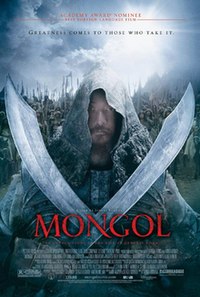 I liked it a lot. (The 1962 Taras Bulba, which I also just watched, I didn't like so much, but that's a different post.) A lot of reviewers seem to have characterized it as an "Asian Braveheart," which is just the sort of short-sighted trope the Internet was born to disseminate. I mean, come on, what was The Godfather, a Sicilian Macbeth? The equation seems to be: sprawling battle scenes, breathtaking panoramics of the setting's landscape, a tasteful love affair and a father/son motif=pre-Catholic badass Mel Gibson.
I liked it a lot. (The 1962 Taras Bulba, which I also just watched, I didn't like so much, but that's a different post.) A lot of reviewers seem to have characterized it as an "Asian Braveheart," which is just the sort of short-sighted trope the Internet was born to disseminate. I mean, come on, what was The Godfather, a Sicilian Macbeth? The equation seems to be: sprawling battle scenes, breathtaking panoramics of the setting's landscape, a tasteful love affair and a father/son motif=pre-Catholic badass Mel Gibson. I don't buy it. For one thing, I don't think Mongol succeeds where Braveheart did. The battle scenes, while brilliantly choreographed, don't bother to highlight any secondary characters' contributions, thus robbing them of a potential emotional punch. For another thing, filmmaker Sergei Bodrov takes the undoubtedly bloody and tumultuous childhood of one of history's most notorious rulers and adds a pathos I found near-impossible to swallow. The future Khan (his birth name was Temujin, "ironmaker," for the record) fought a battle over his wife, when most Mongols had several? Multiple arrows in the back only feed his rage? All he needs to do now is yell "This! Is! Mongolia!" and kick some doofus into a nearby pit.
But that's all secondary. Bodrov takes Temujin and makes you root for him. We first meet him as a nine-year-old choosing his bride, although ten-year-old Borte, of a neighboring tribe, winds up choosing him first. He loses his father to another tribe's treachery. He can't get his own tribe to accept him as ruler in his father's place. He flees a rival ruler's sword. He hides in the steppes, meets a blood brother, comes back for Borte to marry her, loses her, reclaims her in battle, and continues on his meteoric rise to power.
The locations were well-chosen; they highlight the story more than effectively. The acting is believable. The battle scenes are engrossing, although, what with computer-added swarms of warriors, digital thunderstorms and CGI blood, their effect is somewhat muted.
The film ends with a cheesy title card: "Genghis Khan's journey had only just begun," or some such words. Cheesy or not, the carrot works: I am so there when it comes out.
No comments:
Post a Comment